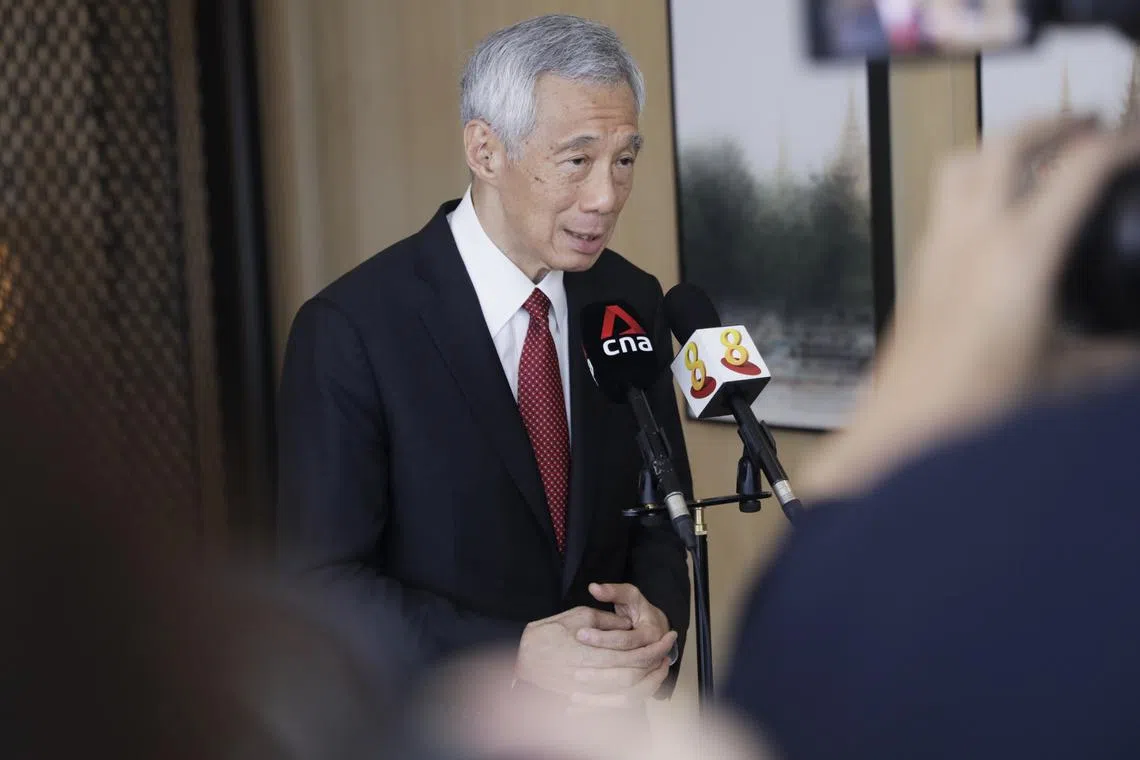Economies should work together on new trade rules while abiding by existing ones: PM Lee
Sign up now: Get ST's newsletters delivered to your inbox

Even in a more complicated world, there remains a need for a strong, rules-based trading system, said PM Lee Hsien Loong.
ST PHOTO: KELVIN CHNG
BANGKOK - Economies have to work together towards transparent rules for global trade amid a more challenging landscape, said Prime Minister Lee Hsien Loong on Saturday.
While there is a need for new rules or an update of existing ones, till there is agreement on these moves, economies should abide by existing rules or it will be the law of the jungle, he added.
“Apec is one of the places where we can discuss these things and maintain engagement, and at least keep talking to one another while we solve the problems,” he said in an interview with Singapore media after the 29th Asia-Pacific Economic Cooperation (Apec) Economic Leaders’ Meeting ended.
Asked how increasing geopolitical tensions have affected economic integration and growth, PM Lee said it will be a “very long time” before a free trade zone spanning the whole of the Asia-Pacific can happen, but there is a need to cooperate with one another on a more limited scale towards the ideal of free trade.
It is important for economies to keep on talking, with an emphasis on trade and the need for rules for countries to work together, said PM Lee.
While the old mindset is that freer trade is better, today, some may think that national security or resilience is better, he added. “It’s a different perspective, but it doesn’t mean we don’t need rules.”
At the summit in Bangkok earlier on Saturday, PM Lee told fellow leaders that globalisation and economic cooperation remain important – even if they have to be moderated by other valid concerns – if economies are to prosper.
He called on economies to continue to work towards Apec’s core objective of trade and investment liberalisation and facilitation. He also said it was timely that this year’s host, Thailand, had started a refreshed conversation on the Free Trade Area of the Asia-Pacific which Apec leaders had agreed to work towards.
The geopolitical context has changed substantially, hindering Apec from achieving its full potential, he noted. But even in a more complicated world, there remains a need for a strong, rules-based trading system, he said.
Calling for an update to the World Trade Organisation, he said: “Even economies that are at odds with one another, and that intervene to promote industrial policy and nurture national champions, will benefit from a sound multilateral framework, instead of the anarchic law of the jungle.”
PM Lee noted that Apec was formed in 1989 at a time when globalisation was intensifying, economies were deepening economic cooperation and barriers to international trade were falling. Apec provided an important platform to champion free and open trade and investment as well as promote regional economic integration.
The grouping’s 21 member economies today account for close to half of global trade and more than 60 per cent of the world’s gross domestic product.
More than 30 years later, the global situation has changed, with the war in Ukraine posing a major threat to the global order, noted PM Lee. Other troubling trends include growing rivalry and mutual distrust between major economies, national security considerations trumping economic arguments, the bifurcation of technology, and principles of market efficiency, equal treatment and fair competition taking a back seat to considerations of supply chain resilience and technological dominance.
Economies should work together to foster the growth of new forms of trade, which have great potential for win-win cooperation, said PM Lee. These include areas such as the green economy, in which Singapore will do its part, as well as the digital economy.
“Today, free trade is under stress, and globalisation is on the wane. But our end goal cannot be self-isolation or autarky. That would diminish trust, undermine security, and impoverish us all,” he said.
“So I look forward to working with others to continue pushing for free and open trade and investment, to enhance both our prosperity as well as our security in a troubled world.”
In the interview with Singapore media, PM Lee was also asked whether geopolitical temperatures have cooled with the recent in-person summits. The Asean Summit in Phnom Penh and Group of 20 summit in Bali took place just before the Apec meet.
“I don’t think the temperatures have cooled. The meeting between Xi and Biden
“But at least both countries have acknowledged that they want to try and stabilise the relationship, and they do not want to collide with one another. And that is positive,” he added.
He noted that face-to-face meetings allow for more opportunities for leaders to interact and engage, as opposed to online communication, which can be stilted.
“From a small country’s point of view, we greatly appreciate having the chance to put our perspective across, to meet quite a range of leaders and to stay on the radar, and to have them hear what we are concerned about and how we hope the world will move,” he said.



